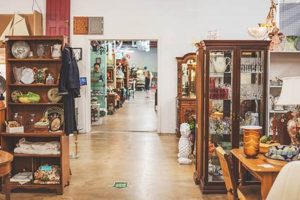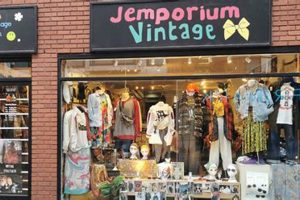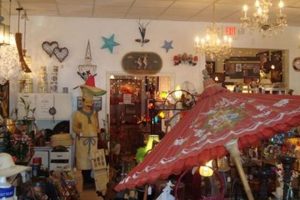Establishments in Greensboro, North Carolina, specializing in the sale of pre-owned clothing, accessories, and home goods from past eras constitute a significant retail sector. These businesses offer a curated selection of items that reflect distinct periods, often characterized by unique styles, materials, and manufacturing techniques. Their inventory may include apparel from the mid-20th century, antique furniture, and collectible decorative objects.
The presence of these specialty retailers benefits the local economy by attracting tourism and providing unique shopping experiences. They contribute to sustainable practices by promoting the reuse and repurposing of existing goods, thereby reducing textile waste. Historically, such businesses have played a role in preserving and celebrating design trends and cultural artifacts from various points in time.
The following sections will provide a detailed overview of factors to consider when choosing such a retail establishment, highlight some notable locations within the city, and offer insights into the economic and environmental impact of this specific segment of the retail market.
Successfully engaging with Greensboro’s establishments specializing in pre-owned, period-specific merchandise requires careful consideration of several key factors. The following guidelines offer practical advice for maximizing value and ensuring a satisfactory shopping experience.
Tip 1: Thoroughly Inspect Merchandise. Prior to purchase, meticulously examine all items for signs of wear, damage, or alteration. Pay close attention to seams, closures, and fabric integrity. Imperfections should be factored into the item’s perceived value.
Tip 2: Verify Authenticity and Provenance. If seeking items purported to be from a specific era or designer, research hallmarks, labels, and manufacturing techniques associated with that period. Consult with knowledgeable staff or independent experts to authenticate questionable pieces.
Tip 3: Consider Garment Sizing Variations. Vintage clothing sizes often differ significantly from contemporary standards. Obtain accurate body measurements and compare them to the garment’s dimensions, allowing for potential alterations.
Tip 4: Negotiate Prices Strategically. Many establishments allow for negotiation, particularly on items with minor imperfections or those that have been in inventory for an extended period. Research comparable items online to determine a fair market value.
Tip 5: Understand Store Policies on Returns and Exchanges. Before finalizing a purchase, clarify the retailer’s policies regarding returns, exchanges, and refunds. Document the policy in writing to avoid potential disputes.
Tip 6: Assess the Store’s Specialization and Inventory Turnover. Some retailers focus on specific eras or garment types. Evaluate whether the store’s overall selection aligns with one’s particular interests and budgetary constraints. High inventory turnover often indicates a frequent influx of new merchandise.
Tip 7: Factor in Cleaning and Restoration Costs. Many vintage items require professional cleaning or restoration. Obtain cost estimates for these services before making a purchase, and factor those expenses into the overall budget.
By adhering to these recommendations, individuals can effectively navigate Greensboro’s vintage retail landscape, acquire unique and valuable items, and mitigate potential risks associated with purchasing pre-owned merchandise.
The subsequent sections will explore the economic and environmental advantages associated with supporting these local businesses.
1. Unique Merchandise Selection
The distinguishing characteristic of establishments specializing in pre-owned goods within Greensboro, North Carolina, lies in their offering of merchandise unavailable in conventional retail outlets. This curated selection reflects historical trends, diverse styles, and one-of-a-kind items, appealing to consumers seeking alternatives to mass-produced goods.
- Rarity and Limited Availability
Items found in these stores are often rare or no longer manufactured, providing customers with the opportunity to acquire distinctive pieces. The limited availability enhances the appeal for collectors and individuals seeking personalized styles. An example is locating a specific designer’s dress from the 1960s, unavailable elsewhere.
- Variety Reflecting Historical Eras
The assortment showcases the evolution of fashion and design across different decades. This variety allows customers to explore and appreciate the craftsmanship and aesthetics of past eras. Customers might find items from the Victorian era to the late 20th century.
- Individuality and Self-Expression
These stores empower customers to cultivate unique personal styles by offering items that deviate from contemporary fashion norms. The focus is on expressing individuality through vintage clothing and accessories. A shopper could create a unique outfit reflecting a specific historical period or a blend of different eras.
- Sustainable Consumption and Repurposing
Offering pre-owned goods promotes sustainable consumption practices by extending the lifespan of existing items. It reduces the demand for new manufacturing, thereby minimizing environmental impact. This approach aligns with the growing consumer awareness of environmental responsibility.
The availability of rare, historically significant, and individually expressive items positions Greensboro’s pre-owned merchandise retailers as valuable resources for consumers seeking alternatives to mass-produced goods. These establishments promote individuality and sustainable consumption within the local retail landscape.
2. Sustainable Retail Practices
The operation of establishments specializing in pre-owned goods in Greensboro, North Carolina, inherently aligns with principles of sustainable retail. This connection stems from the core business model, which centers on extending the lifecycle of existing products, thereby reducing the demand for new manufacturing and its associated environmental burdens. A direct consequence of this model is the minimization of textile waste, a significant environmental concern globally.
The importance of sustainable practices as a component of these retail outlets cannot be overstated. By offering alternatives to fast fashion and disposable consumerism, these stores provide consumers with opportunities to make environmentally conscious purchasing decisions. A real-life example is a local Greensboro store that actively promotes the environmental benefits of buying used clothing through informational displays and community events. This serves to educate consumers on the ecological impact of their choices, encouraging a shift towards more responsible consumption patterns.
Understanding the link between Greensboro’s pre-owned merchandise retailers and sustainable practices is practically significant for several reasons. It allows consumers to support businesses that are actively contributing to environmental conservation. It fosters awareness of the detrimental effects of the textile industry on the planet. Furthermore, it promotes a circular economy model, where products are reused and repurposed, reducing the need for resource extraction and waste disposal. The challenge lies in scaling these sustainable practices to a broader consumer base and integrating them into mainstream retail models. These efforts contribute to a more environmentally responsible and economically viable future.
3. Local Economic Impact
Greensboro’s establishments specializing in pre-owned merchandise contribute to the local economy through various mechanisms. They generate revenue via retail sales, providing employment opportunities for residents in sales, management, and restoration roles. The presence of these businesses attracts both local shoppers and tourists, increasing foot traffic in commercial districts and supporting adjacent businesses, such as restaurants and cafes. Increased consumer spending in these areas translates into higher tax revenues for the city.
The local economic impact is amplified by the unique character of these stores. They offer curated selections that cannot be found in chain retailers, drawing customers from outside the immediate area. For example, a vintage store hosting a special event featuring locally sourced items or a collaboration with a local artist can significantly boost its visibility and attract customers. Furthermore, these businesses often source their merchandise locally, supporting other small businesses and individuals who supply vintage items. This creates a network of economic activity within the community.
In summary, establishments specializing in pre-owned merchandise in Greensboro play a measurable role in stimulating the local economy. Their activities generate revenue, create jobs, and attract customers to the city. Supporting these businesses contributes to the overall economic health and vitality of Greensboro while fostering a unique and diverse retail landscape. Challenges include competition from online retailers and fluctuating consumer preferences, requiring these stores to adapt their strategies to remain competitive and continue contributing to the local economy.
4. Historical Fashion Preservation
Establishments specializing in pre-owned garments and accessories in Greensboro, North Carolina, actively contribute to the preservation of historical fashion. These retailers serve as repositories of past sartorial trends, offering tangible examples of design aesthetics and manufacturing techniques from various eras.
- Dissemination of Knowledge
These establishments educate customers about the history of fashion through the garments they offer. By providing access to clothing from different periods, they enable individuals to examine the evolution of styles, materials, and construction methods. For instance, a store might highlight the distinctive tailoring of a 1940s suit, demonstrating the design principles of that era. This process fosters an appreciation for the craftsmanship and artistry of past eras.
- Conservation of Material Culture
Vintage retailers preserve historical clothing and accessories that might otherwise be lost or discarded. By acquiring, restoring, and reselling these items, they extend their lifespan and prevent them from ending up in landfills. The preservation of a rare 1920s flapper dress, complete with original beadwork and embellishments, serves as an example of this conservation effort. These efforts ensure that tangible artifacts of fashion history are accessible to future generations.
- Inspiration for Contemporary Design
Garments and accessories from the past serve as a source of inspiration for contemporary designers and fashion enthusiasts. Vintage stores provide a resource for studying historical silhouettes, textiles, and embellishments, which can be incorporated into new designs. A designer might draw inspiration from the cut of a vintage jacket or the pattern of a vintage fabric, adapting these elements for modern clothing. This cyclical process ensures the continual evolution of fashion, rooted in historical precedent.
- Promotion of Sustainable Practices
By extending the lifespan of clothing, vintage stores promote sustainable practices within the fashion industry. This reduces the demand for new manufacturing, which in turn conserves resources and minimizes environmental impact. The act of buying and wearing vintage clothing becomes a statement of environmental responsibility, challenging the fast-fashion industry’s emphasis on disposable garments.
The preservation of historical fashion, as facilitated by vintage retailers in Greensboro, North Carolina, benefits both the local community and the broader cultural landscape. These establishments offer more than just clothing; they provide a link to the past, fostering appreciation for design history and promoting sustainable practices. They are cultural assets that contribute to the city’s identity and attract individuals interested in unique and historically significant items.
5. Community Cultural Hubs
Establishments specializing in pre-owned garments and accessories within Greensboro, North Carolina, frequently function as informal community cultural hubs. This arises from their capacity to attract individuals with shared interests in historical fashion, sustainable practices, and unique personal style. The concentration of these shared values creates a social environment conducive to interaction and exchange. For instance, a vintage store organizing a themed event showcasing garments from a specific era can serve as a gathering point for enthusiasts, promoting discussions about design, history, and personal experiences related to fashion. This event can, in turn, strengthen social bonds among attendees and foster a sense of belonging within the community.
The operation of these stores can actively contribute to community engagement through various initiatives. These might include collaborations with local artists to create displays that integrate vintage clothing with contemporary art, workshops on repurposing vintage garments, or partnerships with local historical societies to present educational programs about fashion history. A Greensboro store, for example, might partner with a local museum to curate an exhibit showcasing the evolution of dress styles in the city over the past century. The result of these collaborations and events amplifies the stores’ role as cultural resources, providing opportunities for learning, creative expression, and community building. The cultural impact also extends beyond the immediate community, attracting visitors from other areas and contributing to Greensboro’s reputation as a destination for unique cultural experiences.
In summary, Greensboros establishments specializing in pre-owned merchandise offer more than just retail goods; they provide a social and cultural nexus for individuals interested in fashion, history, and sustainability. These stores stimulate interaction, learning, and community building by hosting events, collaborating with local artists, and preserving tangible artifacts of the past. While challenges exist in maintaining relevance and attracting a diverse audience, the potential for vintage stores to function as community cultural hubs strengthens their significance within the local landscape.
Frequently Asked Questions Regarding Greensboro, North Carolina Establishments Specializing in Pre-Owned Merchandise
The following questions address common inquiries regarding the operation, value, and impact of establishments specializing in pre-owned garments and accessories within Greensboro, North Carolina.
Question 1: What types of merchandise are commonly found in establishments specializing in pre-owned merchandise in Greensboro, NC?
These establishments typically offer a curated selection of clothing, accessories, and home goods from previous eras. Merchandise may include apparel from the mid-20th century, antique furniture, vintage jewelry, and collectible decorative objects. The specific inventory varies based on the store’s specialization and sourcing practices.
Question 2: How can the authenticity and condition of vintage items be verified?
Verification requires careful inspection for signs of wear, damage, or alterations. Examination of labels, seams, and fabric integrity is crucial. For items purported to be from a specific era or designer, research hallmarks and manufacturing techniques associated with that period. Consulting knowledgeable staff or independent experts may be necessary for authentication.
Question 3: Do establishments specializing in pre-owned merchandise typically offer returns or exchanges?
Policies regarding returns and exchanges vary. It is crucial to clarify the retailer’s specific policies before finalizing a purchase. Documenting the policy in writing can prevent potential disputes. Many establishments offer limited or no returns on vintage items, owing to their unique nature and potential for alteration after purchase.
Question 4: What are the benefits of purchasing pre-owned merchandise compared to new items?
Purchasing pre-owned merchandise promotes sustainable consumption by extending the lifespan of existing goods and reducing textile waste. It offers access to unique, historically significant items not readily available in contemporary retail. It often provides cost savings compared to purchasing new items of comparable quality.
Question 5: How do these establishments contribute to the local Greensboro economy?
Establishments specializing in pre-owned merchandise contribute to the local economy through retail sales, job creation, and increased tourism. They attract shoppers to commercial districts, supporting adjacent businesses and generating tax revenue for the city. They may also source merchandise locally, supporting other small businesses.
Question 6: What factors should be considered when determining the value of a vintage item?
The value of a vintage item depends on its rarity, condition, historical significance, and desirability. Designer labels, unique design elements, and provenance can increase value. Market demand and comparable sales data inform pricing. Imperfections and alterations typically decrease value.
These answers provide insights into the operations and benefits of establishments specializing in pre-owned merchandise in Greensboro, North Carolina.
The next section will offer a comprehensive conclusion to the discussion.
Concluding Remarks on Greensboro, North Carolina Establishments Specializing in Pre-Owned Merchandise
This exploration of “vintage stores greensboro nc” has highlighted their multifaceted role within the local economy and cultural landscape. These establishments provide access to unique merchandise, promote sustainable retail practices, preserve historical fashion, and function as community cultural hubs. Their contribution extends beyond mere retail, fostering a sense of community and promoting responsible consumerism.
Continued support for these businesses is crucial for maintaining a diverse and vibrant retail environment within Greensboro. Their existence not only offers consumers alternatives to mass-produced goods but also underscores the importance of preserving history and promoting sustainable practices for future generations. Individuals are encouraged to explore and engage with these establishments to appreciate their value and contribute to their continued success.







